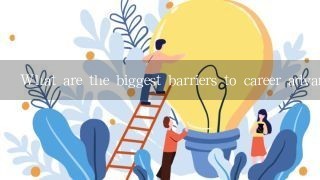What are the biggest barriers to career advancement in the 21st century?

Answer:
Biggest Barriers to Career Advancement in the 21st Century:
1. Technological Advancements:
- Rapidly changing technology, automation, and artificial intelligence pose significant challenges for workers with traditional skills.
- Employers seek candidates with specialized knowledge and skills in emerging fields.
2. Skill Gap and Education Imbalance:
- There is a significant difference between the skills employers require and what many workers have learned.
- Lack of relevant education, training, and certifications can hinder career advancement.
3. Competition from Abroad:
- Globalization and outsourcing have increased competition for skilled workers.
- Companies are increasingly willing to hire international candidates with higher salaries and benefits.
4. Ageism and Bias:
- Age discrimination and unconscious bias can limit opportunities for experienced workers.
- Women, minorities, and other underrepresented groups face additional barriers.
5. Work-Life Balance Challenges:
- The 24/7 nature of the modern workplace can be challenging for employees, leading to burnout and career dissatisfaction.
- Employers need to offer flexible work arrangements and support employee well-being.
6. Lack of Mentorship and Networking Opportunities:
- Limited mentorship and networking connections can hinder career growth.
- Lack of guidance and support can lead to missed opportunities and stalled advancement.
7. Economic Disparity:
- Unequal access to education, healthcare, and economic opportunities can create a significant barrier to career advancement for marginalized groups.
8. Mental Health and Well-being Concerns:
- High levels of stress, anxiety, and depression can negatively impact productivity and career performance.
- Employers need to prioritize employee well-being and offer support services.
9. Lack of Diversity and Inclusion:
- Organizations with diverse workforces and inclusive practices are more likely to attract and retain top talent.
- Lack of diversity can limit perspectives and hinder innovation.
10. Career Hesitancy:
- Some workers may hesitate to pursue advancement due to fear of job loss, uncertainty about the future, or lack of clear career paths.






































































